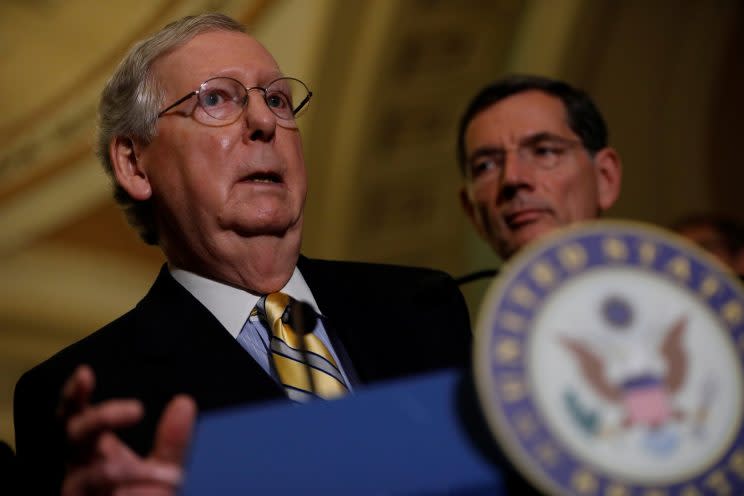McConnell once praised ‘slow and steady deliberation.’ Why is he discarding that now?

WASHINGTON — In his 2016 memoir, Senate Majority Leader Mitch McConnell called the U.S. Senate a “precious institution.”
But McConnell’s description of how the Senate should work, which he said is essential to American democracy, is at odds with the way he has so far tried to ram a health care bill through the upper chamber of Congress. It’s unclear how much he will slow down the process after being forced to scrap plans for a vote this week due to lack of support from Republican senators.
McConnell, a Republican from Kentucky in his 32nd year as a senator, began his book “The Long Game” talking about the essence of the Senate’s unique features.
“The Senate is the only legislative body on earth where a majority is not enough — most things require sixty votes to pass,” McConnell wrote.
Of course, the entire Republican approach to changing Obamacare is to do it with only 51 votes through a special exception to the requirement for a 60-vote supermajority. The McConnell argument is that this is how Democrats in part passed the law, and so they will use the same lever to change it.
But in his book, McConnell lamented that “without this moderating effect” of bipartisan legislation, “today’s majority passes something and tomorrow’s majority repeals it.”
“When the Senate is allowed to work the way it was designed to — meaning a place where nothing is decided without a good dose of deliberation and debate, as well as input from both the majority and minority parties — it arrives at a result that is acceptable to people all along the political spectrum,” McConnell wrote.
He bemoaned the fact that “in recent years, however, we’ve lost our sense for the value of slow and steady deliberation.”

Most importantly, McConnell said, the Senate’s role is critical to the health of the republic. “The moment we conclude that our political institutions are no longer up to the task of resolving the challenges we face is the moment we give up on the American project altogether,” he wrote.
McConnell, however, crafted the Senate health bill without input from Democrats or even from most Republicans in the Senate, and he rushed it to the Senate floor without a single public hearing. Sen. Mike Lee, R-Utah, a member of the working group for the bill, was among the GOP senators who complained last week that they had yet to see the legislation. The bill entirely skipped over the committee process, a key deliberative space.
McConnell wrote in his book that he was going to restore the committee process. He said that when he became majority leader after the 2014 elections, he “set out to repair the damage Democratic leaders had done to the Senate over the previous eight years,” which meant, among other things, “reactivating the all but dormant committee process.”
Washington has been abuzz with talk for some time now about why McConnell chose to rush the bill the way he did. But while there are various theories about why he’s done it, there aren’t many defenses for the way it’s turned out.
“The process obviously makes all the talk about regular order in the last few years seem like empty rhetoric. But more than that, it undermined the policy substance and therefore the prospects of the bill,” said Yuval Levin, editor of National Affairs and an influential conservative thinker. “It seems to me that the bill’s virtues are largely functions of responses to public criticism while its vices are mostly functions of closed, secret work.”
Former Sen. Alan Simpson, who served almost two decades in the chamber, said that “it’s not a good thing when you see a bill come out that’s all Democrats or Republicans.”
“That’s not how the Constitution was formed,” Simpson said. “They didn’t think compromise was a four-letter word.”

And the health care legislation was the second time in three months that McConnell has taken action that breaks with the institutional norms of the Senate. In April, he responded to Democrats’ filibuster of Neil Gorsuch by dissolving the filibuster power of the minority party in the Senate as a tool to block Supreme Court nominees.
These two episodes have “called into question” the degree to which McConnell believes preserving the Senate’s institutional character is more important than short-term political gains, said Steve Bell, a former Senate Republican staffer now at the Bipartisan Policy Center.
Related slideshow: Protesters across the country oppose GOP’s health care plan >>>
Defenders of McConnell’s moves during the Supreme Court and health care fights can argue that he believes he is trying to right wrongs done by Democrats when they controlled the chamber. When he led the vote to abolish the filibuster for Supreme Court nominees, McConnell argued that Republicans were taking a restorative step.
“Our Democratic colleagues have done something today that is unprecedented in the history of the Senate. Unfortunately, it has brought us to this point,” McConnell said on the Senate floor. “We need to restore the norms and traditions of the Senate and get past this unprecedented partisan filibuster.”
When Yahoo News asked McConnell’s deputy chief of staff Don Stewart about the health care process, he focused on “how Obamacare was passed” and noted that the majority leader had “noted at the time that it could be undone the same way because it wasn’t durable.”
Stewart also referred more broadly to former Democratic Senate Majority Leader Harry Reid’s tenure, saying McConnell was “restoring the damage of the Reid years.”

But nobody believes that McConnell’s retaliation in response to Democratic actions is going to stop the cycle of partisan political warfare. The only chance of preserving rules in institutions like the Senate is if someone breaks out of the downward spiral by refusing to retaliate. In the zero sum, short-term world of politics, that’s extremely hard to do.
And while using what’s known as the reconciliation process to pass a repeal of Obamacare with 51 votes rather than 60 — the threshold needed to overcome a filibuster — could be argued to be a proportionate response, that’s not what Republicans are doing. They’re passing a new bill to change some parts of Obamacare, and “trying to legislate on one of the nation’s most complicated policy issues,” as Brookings Institution scholar Sarah Binder put it.
“Health care affects one-sixth of the economy and may have life-or-death consequences for many Americans on Obamacare,” Binder wrote.
And after all that, McConnell’s rushing of the bill is still left unexplained. Why the need to push it through so fast, without a committee process or public debate?
Related slideshow: ‘Die-in’ protesters dragged away from McConnell’s office >>>
“Usually, issues that demand secret negotiations are must-pass measures about to hit a nonnegotiable deadline, such as failing to raise the debt ceiling or to fund the government on time. When the stakes are high and the consequences of failure broadly considered unacceptable, hiding negotiations from the public is usually easier to justify,” Binder wrote.
What does McConnell find so necessary about quick passage of the health bill that he’s willing to violate norms of the Senate that he claims to revere?
McConnell, first of all, has tried to argue that the health care issue is familiar to all, and so the bill would not be a surprise. “We’ve been dealing with this issue for seven years. It’s not a new thing,” he told reporters.
There is a school of thought that says McConnell wants to vote on something — anything — so that he can move the legislative focus on to tax reform. But he and his advisers have been adamant that they need to follow through on the many times they have promised over the past several years to repeal Obamacare, even if the Republican bill only alters it.

And there is also the possibility that McConnell’s rush to vote on health care has been driven by the fear of what President Trump might do to destabilize the process more than he already has. The president has a notoriously short attention span and “doesn’t understand anything about a legislature,” as Simpson put it.
And Trump has made a habit as president of visiting self-inflicted wounds on himself and his party. Just in the past week, Trump has done significant damage to the health care effort. He confirmed to a reporter that he had in fact called the House version of the health bill “mean,” creating deeper questions about his grasp of the policy details and how much his word is worth when he backs something. Trump had publicly celebrated the House bill’s passage at a Rose Garden ceremony.
And Trump allies signed off on ads attacking Sen. Dean Heller, R-Nev., for publicly criticizing the first public draft of the bill, even as McConnell was negotiating with Heller to try to get him to yes. The New York Times reported Tuesday that McConnell complained to White House chief of staff Reince Priebus about the anti-Heller ads, calling them “beyond stupid.”
If the health care bill were to follow the traditional, lengthy route through Congress, what else might the impatient president do while angrily watching hyperbolic cable news and tweeting his thoughts?
And then there is the feverish opposition among Democrats to anything the White House tries to accomplish, best demonstrated by the unprecedented resistance to Trump’s choice for Cabinet posts. But while some around McConnell believe a deliberative and bipartisan process is impossible at the moment, the majority leader himself said it was undesirable.
“Either Republicans will agree and change the status quo, or [health care] markets will continue to collapse and we’ll have to sit down with Sen. Schumer,” McConnell said outside the White House on Tuesday after meeting with the president and most of the other 51 Republican senators. “And my suspicion is any negotiation with Democrats will include none of the reforms that we would like to make on the market side and the Medicaid side.”
Nonetheless, Simpson predicted that McConnell would still find a way to pass a bill.
“He’s going to pull every stop on the organ. He will be the Phantom of the Opera,” Simpson said. “He will put the master switch together, and somehow he will get something.”
Read more from Yahoo News:



